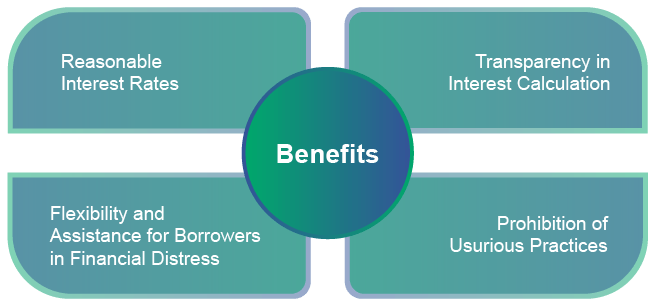INTRODUCTION
The Reserve Bank of India (RBI) published a circular for lenders’ adherence to the Fair Practices Code, particularly in terms of interest charging. This guideline functions as an ideal instructive route to ethical and equitable lending practices along with providing adequate freedom to REs as regards their loan pricing policy. It underlines the critical role of lenders in ensuring that borrowers are treated properly and have thorough understanding of interest-related issues. The charging of interest is crucial to this connection and must be done in a fair and transparent manner to ensure both parties’ financial well-being. In this article, we will look at the importance of fair practices regulations for lenders, specifically when it comes to charging interest.
Applicability:
| S.No | REGULATED ENTITIES |
|---|---|
| 1. | Commercial Banks |
| 2. | Small Finance Banks |
| 3. | Non-Banking Financial Institutions |
| 4. | Local Area Banks |
| 5. | Regional Rural Banks |
| 6. | Urban Cooperative Banks |
| 7. | District Central Cooperative Banks |
| 8. | Microfinance Institutions |
| 9. | Housing Finance Companies |
Exemption:
The mandate shall not apply to Payments banks.
Understanding Fair Practices Code:
The Fair Practices Code (FPC) acts as a guideline for lenders to ensure fairness, openness, and ethical behaviour in their interactions with borrowers while charging interest and other charges. The Guidelines dated April 29, 2024 establishes the criteria and processes that lenders must follow, with a focus on client protection and promoting a fair and competitive lending market. One of the most important components of FPC is interest charging, which must be carefully considered in order to avoid abuse and guarantee that borrowers are treated fairly.
Earlier, in August 2023, RBI issued instructions related to Fair Lending Practice to regulate Penal Charges in Loan Accounts as supervisory reviews by Bank has indicated divergent practices amongst the REs with regard to levy of penal interest/charges leading to customer grievances and disputes.
In such cases Key Fact Statements provided to borrowers at the time of sanction of loan plays a vital role to ensure disclosures and transparency. For internal practices, Regulated entities are required to frame policies for charging of interest, miscellaneous charges, penalty and get them approved from their board of directors.
Another guideline dated April 15, 2024 highlighted the important structuring of Key Fact Statement and mandatory particulars to be included. The notification put forth updated format for framing the key fact statement, illustrative examples of calculation of Annual Percentage Rate and disclosure of repayment schedule.
RBI clearly mentioned that any fees, charges, etc. which are not mentioned in the KFS, cannot be charged by the REs to the borrower at any stage during the term of the loan, without explicit consent of the borrower. The KFS shall also be included as a summary box to be exhibited as part of the loan agreement. Charges recovered from the borrowers by the REs on behalf of third-party service providers on actual basis, such as insurance charges, legal charges etc., shall also form part of the APR.
What is the Purpose of this Code?
- During the onsite audit of Regulated Entity (RE), the Reserve Bank discovered instances of lenders resorting to various unfair tactics in charging interest.
- Interest is charged from the date of loan sanction or loan agreement execution, not the date of actual fund distribution to the customer.
- In the case of loans distributed via cheque, cases were seen where interest was charged from the date of the cheque and the cheque was turned over to the customer many days later.
- Some Regulated Entity (RE) charged interest for the entire month when loans were disbursed or repaid during the month, rather than just the outstanding period.
- Additionally, some Regulated Entity (RE) collected instalments in advance but charged interest on the entire loan amount.
- These and other non-standard techniques of charging interest are not in accordance with the spirit of fairness and transparency in dealing with clients.
RBI directed its Regulated Entity (RE) to repay excess interest and charges to clients. Regulated Entity (RE) is also urged to employ online account transfers instead of cheques being issued in a select circumstance for loan disbursement.

Conclusion:
In conclusion interest on loans must be charged in a fair, transparent, and ethical manner in order to ensure customer protection and financial integrity. Fair practices guidelines serve an important role in guiding lenders to do business responsibly and treat borrowers fairly. By adhering to these norms and embracing the concepts of fairness and openness, lenders may foster confidence, promote financial inclusion, and contribute to the economy’s long-term prosperity.
Disclaimer
The information provided in this article is intended for general informational purposes only and should not be construed as legal advice. The content of this article is not intended to create and receipt of it does not constitute any relationship. Readers should not act upon this information without seeking professional legal counsel.



